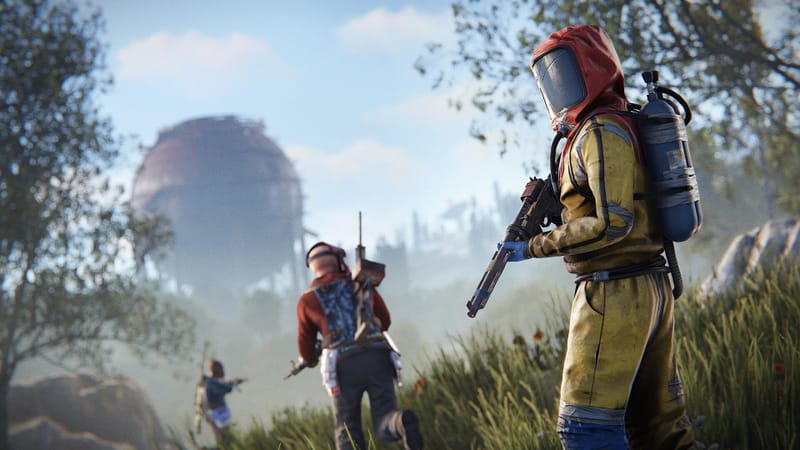Solo vs. Group Play in Rust: Which is Right for You?

Rust, the popular multiplayer survival game, offers players the freedom to choose their playstyle, whether it's braving the harsh world alone or joining forces with others to survive and thrive. Both solo and group play have their unique challenges, rewards, and appeal. In this article, we'll explore the pros and cons of solo and group play in Rust, helping you determine which approach suits your preferences and playstyle best.
Solo Play: The Lone Wolf Experience
Playing Rust solo can be an incredibly immersive and rewarding experience. As a lone wolf, you have complete control over your decisions, base design, and resource management. You can move at your own pace, set your own goals, and adapt to the ever-changing world of Rust without the need to coordinate with others.
One of the main advantages of solo play is the sense of accomplishment that comes with overcoming challenges on your own. Every successful raid, every hard-earned resource, and every base upgrade feels like a personal triumph. Solo play also allows for a more stealthy approach, as you can more easily avoid detection and navigate the world unnoticed.
However, solo play comes with its own set of challenges. Without the support of a group, you'll need to be self-sufficient in gathering resources, crafting gear, and defending your base. You'll also be more vulnerable to attacks from larger groups or more experienced players. Solo players must be constantly vigilant, as a single mistake can lead to the loss of hard-earned progress.
To succeed as a solo player, it's essential to prioritize survival and be efficient in your resource management. Focus on building a small, secure base and gradually expand as you gather more resources. Master the art of stealth, using the environment to your advantage and avoiding unnecessary confrontations. Develop your skills in PvP combat, as you'll inevitably face hostile players in your journey.
Group Play: Strength in Numbers
Group play in Rust offers a completely different experience compared to solo play. By joining forces with other players, you can pool resources, share responsibilities, and tackle challenges together. Group play allows for more ambitious projects, such as building large, fortified bases or undertaking complex raids.
One of the main benefits of group play is the increased sense of security and support. With multiple players watching each other's backs, you can more easily defend against raids and hostile players. Group members can specialize in different roles, such as resource gathering, crafting, or base building, allowing for a more efficient division of labor.
Group play also opens up new strategic possibilities, such as coordinated raids, flanking maneuvers, and diversionary tactics. With effective communication and teamwork, a well-organized group can become a formidable force on the server.
However, group play also presents its own challenges. Coordination and communication are crucial, as misunderstandings or lack of cooperation can lead to internal conflicts and weakened defenses. Trust is also a significant factor, as infiltrators or griefers can sabotage the group from within.
To thrive in group play, it's essential to establish clear roles, expectations, and communication channels. Foster a sense of camaraderie and trust among group members, and be willing to compromise and adapt to the needs of the group. Develop strategies and tactics that leverage the strengths of each member, and work together to achieve common goals.

Choosing the Right Playstyle for You
Ultimately, the choice between solo and group play in Rust depends on your personal preferences, playstyle, and goals. Solo play offers a more immersive, challenging, and self-reliant experience, while group play provides a sense of camaraderie, shared accomplishments, and increased security.
Consider your own strengths and weaknesses as a player. Do you thrive under pressure and enjoy the challenge of overcoming obstacles alone? Or do you prefer the social aspect of gaming and the satisfaction of working together towards a common goal?
It's also worth noting that you don't have to commit to one playstyle exclusively. Many players enjoy a mix of solo and group play, adapting to the situation and their current objectives. You can start as a solo player to learn the ropes and later join a group to take on bigger challenges, or alternate between solo and group play to keep the experience fresh and engaging.
Conclusion
Whether you choose to brave the world of Rust alone or join forces with other players, the key to success lies in understanding the unique challenges and rewards of each playstyle. Solo play offers an immersive, self-reliant experience, while group play provides strength in numbers and shared accomplishments.
By weighing the pros and cons of solo and group play, and considering your own preferences and goals, you can make an informed decision on which approach to take. Remember, there's no right or wrong choice – the beauty of Rust lies in the freedom to forge your own path and create your own unique stories.
Regardless of your playstyle, having a reliable and high-performance server is crucial for an optimal gaming experience. If you're looking to host your own Rust server, consider Hostari – a trusted provider of game server hosting solutions. With our powerful hardware, DDoS protection, and expert support, Hostari ensures that your Rust server runs smoothly and securely, allowing you to focus on your solo or group adventures. Visit Hostari to learn more about our Rust server hosting options and take your gaming experience to the next level.

